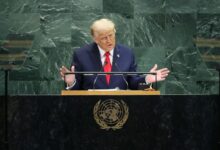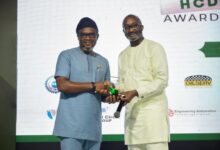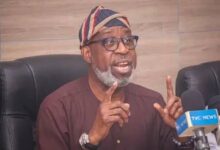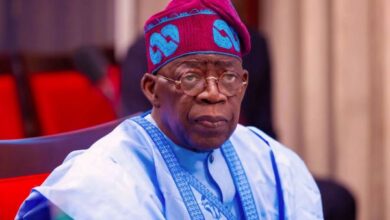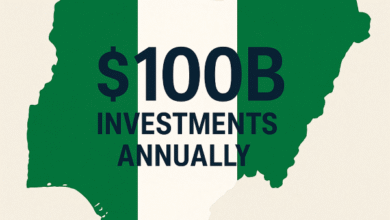AAAN PRESIDENCY: HOW FARE THEE…KELECHI & LANRE?
The Association of Advertising Agencies of Nigeria (AAAN) is a key sub-sectoral group in the Nigerian marketing sector. The Association’s 41st AGM and International Seminar will hold on Thursday, 10th to Saturday, 12th July, 2014 in Abuja with an international seminar on “Political Advertising, Perception Building and Voters Education.”
Meanwhile, it is also an election year for the association as a new team of executives are expected to take over from the Mrs. Bunmi Oni-led team. Mr. Kelechi Nwosu and Mr. Lanre Adisa have since thrown their hats in the ring in their avowed mission to become the next AAAN president. BRANDPOWER took them to task on a number of industry issues and, of course, explain why each man was best equipped to wear the presidential hat.
To this end, both men were served the same set of questions and their answers are as interesting and they are illuminating. So who won ‘after the event’? You be the judge…
(Mr Lanre Adisa pic…)
In your opinion, what have been the contributions of advertising in building great Nigerian brands and delivering consumer fulfillment in Nigeria dating back from when the industry was indigenized in the 70s?
In truth, the contributions are unquantifiable, even though we hardly get credit for our role in the Nigerian economy. Advertising started in Nigeria over eighty-five years ago. In all these years, the Nigerian ad industry has been playing a significant part in keeping other businesses going strong and healthy. Take a brand like Star that has been around for over sixty years. If you were to eliminate the role of advertising support which all these years has been offered by a local agency, what will be the value of that brand today? This is just one example. There are countless such brands that owe their success with the Nigerian consumers to the ingenuity of the local advertising industry. Take brands like Lux, Joy, First Bank, UBA, Peak Milk, Bagco Super Sack from back then, and Indomie, Cowbell, GT Bank and a whole lot more that came on stream later and the telcos- MTN, Glo, Econet as it was called back then and Etisalat. Even now with the advent of e-commerce, a whole lot will be riding on the advertising industry. As at last year, the industry was said to be worth about 300 Billion Naira. In a rebased economy where we are now, it will be good for us to see what we contribute to the GDP.
In terms of industry lingo, there seems to have been a shift from “advertising brands for consumer-satisfaction” to “Brand-building or Branding for fulfilment”. What is the difference and how has this affected the practice and business of advertising in Nigeria?
I’m glad you mentioned Brand Building. The truth is that the dynamics of our trade have shifted considerably, owing in particular to advances in technology. Right now, over 100 million Nigerians have mobile phones. About forty million have smart phones. A large chunk of them access the internet via their phones. People are more informed than ever before. Brands cannot afford to be unilateral when it comes to communicating with the consumers anymore. In other words, the consumer today is at the centre of what we do and we had better take that as the compass for al our brand activities if we expect all the investments in marketing communications to yield any results.
Recently, the Advertising Practitioners’ Council of Nigeria (APCON) rolled out a new set of guidelines for the licensing and operations of advertising by corporate organizations in the various sectors of the industry in Nigeria. Some aspects of these guidelines have received both praises and knocks from various stakeholders what is your take on these new APCON guidelines and what do you think they portend for the growth and development or otherwise of the marketing industry and the nation at large?
There is more to the reforms than the licensing. The licensing is meant to clear the path for all the other benefits inherent in the reforms. And that’s where the real issue is. This industry needs to be sanitised. There are lots of shenanigans going on that these reforms are meant to curb. A very big part of this is in determining who has the right to place anything in the media. APCON is succeeding as regards regulating content, but there is a lot to be done with deployment. In Ghana, for instance, you cannot walk into any media house to place anything unless you are an ad or media agency. That is not the case in Nigeria. If we succeed in plugging this big hole, this will have a significant impact on the health of our businesses. There are other aspects that, if implemented, will earn more revenue and respect for us. However, I must say, this can only work by carrying all the relevant stakeholders along. We owe it to ourselves to build bridges across all the sectors in the interest of our brands and our future.
We understand you have offered to contest the presidency of the Association of Advertising Agencies of Nigeria (AAAN). What is the association about and what do you think are the critical challenges being faced by members of your association presently and how do you intend to tackle them if you become president?
Yes, I’m vying for the presidency of AAAN. This Association came into being over forty years ago. The aim then and even now is to protect and grow the interests of member agencies while also enhancing capacity development. And we do have a lot to be proud of. Sometimes we are too hard on ourselves to realise how much we have achieved. AAAN has the unique role of being a precursor of all the major changes that have been witnessed by the marketing communications industry. We have a proud legacy. Unfortunately, we have also seen a dwindling of our commonwealth, a depletion in respect for what we do, a dearth of talents and a disturbing sense of apathy among our rank and file. These are key issues that require leadership and forthrightness. These are the reasons I am running. We all can’t just shrug in our little corners and hope to wish the problems away. It’s better to light a candle than to curse the darkness.
The first and most important thing for me if I emerge the next president of AAAN is to free the flow of interaction and engagement between the Exco and the general membership, in particular the Heads of Member Agencies (HOMA). In my interactions with our members in recent times, I keep getting the feeling of apathy. We need to have everyone on board. We also need to ensure that we create the right conditions for our members to improve their lot business-wise. With a renewed commitment to implementing the reforms, we can make this happen. We need to add more value to membership of AAAN.
Another key goal is the takeoff of our Advertising Academy. It’s way long overdue. Today, we are running short of talents, craft is falling and talent is getting overpriced in the process. Nigeria is a young country. Almost every other creative business is on the ascendancy talent-wise- music, film, comedy, fashion, name them. We need the same renaissance in advertising.
5) What about the challenges being faced by the industry generally and what is/are your considered panacea?
LA: As stated earlier, the key challenges are: dwindling fortunes as a result of the usurping of our roles by a lot of intruders; the dearth of talents and the lack of respect for what we contribute to clients’ businesses. I believe that a renewed commitment to implementing the reforms will go a long way. Now that is not going to happen overnight. We need our member-agencies to be truly on board in this regard. We should get ourselves ready for a long and arduous battle. Change won’t come on a platter of gold. If we can ensure that we are doing better business, we can solve just about every other challenge confronting us. That is why we all need to play our part in ensuring that AAAN puts its best foot forward at the next elections. What we seem to have been having of late is a sort of “army arrangement” that in a way predetermines the leadership of AAAN with little or no contest of ideas. We cannot expect any meaningful change without taking the leadership of our Association serious enough.
Advertising agency people often say they sell ‘intellectual property’. What exactly does this mean and how effectively have agencies been able to price such ‘intangible product” for the mutual benefit of agencies and their clients?
In truth, what we sell is intangible, but the ideas are more than worth their weight in gold. Our ideas are at the heart of every successful brand. Some of these ideas are so strong, they stick with the brands for so long and change their fortunes for the better. Unfortunately, it is difficult to put the right value to it. One of the things that will come from raising our game business-wise is that agencies can charge better. If a client can see considerable value in the level of our input coming from how well we have been able to empower our teams. At the moment, it’s appalling what some clients pay for agencies’ services all because some of our members are in a survival mode. As an industry, we should be able to arrive at a point in future where we can set minimum standards in remuneration. That way, our members cannot be taken for a ride.
Do you think advertising practitioners and even your association (AAAN) have branded themselves well in Nigeria? It would seem that unlike other professions such as doctors, lawyers and accountants, your top practitioners always seem to prefer a low-profile lifestyle while your association is hardly ever heard or seen taking a position on topical national issues. Is this deliberate and is it the best way to brand yourselves.
I don’t think there is anything deliberate about this. This industry has benefitted greatly from a generation of dreamers. Now these precursors are in retirement. We need to dream new, bigger dreams in tune with where the world is today. We need to set higher standards and benchmark ourselves against the best in the world. When we do that, Nigeria, and indeed the world will hear our stories. We will claim and be celebrated for our role in the scheme of the economy.
What are the 3 critical legacies you wish to leave if you are elected AAAN president in your July congress?
The first one is the implementation of the APCON Reforms with particular interest to agencies’ business relationship with the media. The second is capacity building epitomised by the takeoff of the Advertising Academy and the third is fostering a freer atmosphere for interactions within member agencies and across other sectoral bodies, because at the end, we are all in the same ship, clients, agencies and all stakeholders.
Please give us a brief background of your professional career.
I started my career in 1990 at MC&A: Saatchi & Saatchi as a Trainee Copywriter. I’ve since moved on to work for Rosabel, Franchise, Insight, TBWA\Concept all in different capacities as a creative and later Creative Director. In 2008, I founded Noah’s Ark with a vision of moving Nigeria to the premier league of advertising in Africa. Six years down the line, we are getting closer to that vision with a handful of firsts for our agency and the industry. On record, we are the first Nigerian/West African agency to get published in Lurzer’s Archive. We are also the first to be recognised by Cannes when we were awarded the Cannes National Diplomas for two of our entries for Indomie at last year’s Cannes Lions. And for us, it’s not just about the awards. We have been invaluable partners to our clients. I’ve been engaged with Indomie in different capacities since 2000. Indomie came into Noah’s Ark in 2009 and we’ve been waxing stronger together since then. The same goes for other clients of ours like, GOtv, Swift and Paga.
Who is the essential Lanre Adisa?
I am a simple person driven by a singular goal of working to put Nigeria on the map. I am very passionate about anything I set my mind to and the clients and colleagues I’ve worked with over time can bear me out on this. I’m a firm believer in Nigeria and what Nigerians can achieve given the right atmosphere.
What is your vision for Brand Nigeria in the next 5 years and how should we move from dream to concrete.
Nigeria is on the rise, but it needs to be better managed. We cannot claim to have a brand until we have done the needful job of putting the product in order. Nigeria is growing economically but the majority of Nigerians are not. We need to have our people take pride in being Nigerians before we can project anything to the outside world. So my hope is that Nigeria will enjoy purposeful leadership that will create and spread the commonwealth in the next five years. Then we can project the Nigerian brand.
What is your last word to advertisers, practitioners and your colleagues in AAAN?
We are all in this together. This is the best time to be in this business if we all can change our perspectives and sing from one hymn book. If we can set higher goals. It’s in our best interest to make things work here. To believe in and grow local talent. To tell our unique stories to the world.
Thanks for your time…
Thanks for the opportunity to express our ideas. See you in Abuja.
(Mr Kelechi Nwosu Pic…)
In your opinion, what have been the contributions of advertising in building great Nigerian brands and delivering consumer fulfillment in Nigeria dating back from when the industry was indigenized in the 70s?
Advertising has played a great role in building brands across several categories in the last few decades. In the FMCG area, Unilever brands, NBL, Guinness Brands, and Vono etc. were all built by advertising. Even in Politics, the success of MKO at the polls in 1993 could be attributed to the exciting “Hope 93” campaign, amongst other factors. I believe the role of advertising in building these brands is obvious.
Advertising in Nigeria created that contract between the brands and the Nigeria Consumer and clearly the joy and fulfillment that Nigerians derive from these brands would have been diminished without advertising which made these brands popular and appealing.
Advertising has also been the nucleus of the creative industry. Clearly, many of the Nollywood talent did enjoy patronage and collaboration with the advertising industry. That part of the narrative has been lost somehow.
In terms of industry lingo, there seems to have been a shift from “advertising brands for consumer-satisfaction” to “Brand-building or Branding for consumer-fulfillment”. What is the difference and how has this affected the practice and business of advertising in Nigeria?
Shift advertising has always built Brands to fulfill the needs of the consumers. I believe though that the current shift (from mass communication to customized messaging and to individual customization / bespoke communication) have been made possible even necessary by the penetrating power of the internet. The feedback loop, response time, the message and medium have become stronger and effective. The brands must stay in touch to earn and maintain the credibility that the consumers put on the brand. As they say, the consumer determines the brand based on what the brand does, and says. Put differently, the values of consumer satisfaction have always been there in advertising but these values of effectiveness and consumer fulfillment have improved via the use of better integrated, 360′ channels, especially deploying social media, e-commerce and the internet.
Recently, the Advertising Practitioners’ Council of Nigeria (APCON) rolled out a new set of guidelines for the licensing and operations of advertising by corporate organizations in the various sectors of the industry in Nigeria. Some aspects of these guidelines have received both praises and knocks from various stakeholders what is your take on these new APCON guidelines and what do you think they portend for the growth and development or otherwise of the marketing industry and the nation at large?
New guidelines in the APCON Reform clearly portend growth for the industry.
First, the Reforms seek to “professionalize” the profession much the same way that you have doctors, accountants, lawyers, estate surveyors etc as clear profession. Not only does the reform encourage specialization (i.e. media/creative/full service etc) it also makes it clear that employees in advertiser organizations cannot, without the necessary structure, develop and run ads in the media.
Further, corporate organizations (advertising agencies) via licensing are now better regulated like ICAN, NMA etc. Defaulting Ads and quack practice will now be easier to deal with.
Reform also gives power to the private sector under Window B so that non-members of the sectoral group who meet the provisions, can apply, and be licensed
Criticism of the reform, I believe are either by mistaken or conservative people who may like the status quo. For instance, before now there was no regulation about foreigners practising advertising here. Now there is a guide both for individuals and for companies.
Clearly a lot of the above could be criticized by advertisers and foreign companies looking to doing business the same way.
Overall therefore, reforms will offer Professionalism, better reputation for individuals and companies in the space; Regulate participation in this part of the economy; encourage local industry to grow rapidly with best practice that will check some of the sharp practice from advertisers.
We understand you have offered to contest the presidency of the Association of Advertising Agencies of Nigeria (AAAN). What is the association about and what do you think are the critical challenges being faced by members of your association presently and how do you intend to tackle them if you become president?
Our Association is a body of advertising Agencies formed not only to self-regulate the practice of advertising but also to improve the practice of advertising and marketing communications generally in Nigeria
Our Critical Challenges are: a)Improve our professional standing and reputation; b) Consolidate and build on the APCON Reforms; c) Ensure we open new sources of value/revenue for Agencies and d;Build capacity – train and nourish talent
To tackle them,
I have proposed a couple of concrete steps after consultation with colleagues. These are:
(i) Build a Reputation improvement campaign for ourselves via what we do. We will create and execute a brand Nigeria Campaign focusing on Brand Nigeria National/ Re-orientation to showcase what we are about and what we can do. This will be the carrier upon which we will build our reputation. Other calendar activities: LAIF, International Seminars will be re-energized and publicized to build additional reputational values.
(ii) APCON reforms – we have already started working on ways to ensure that we support the entrenchment of the reform and ensure we support APCON to make them happen.
(iii) Values – to enhance revenue, we will continue to lobby government and Parastatals to utilize only registered Advertising agencies for their projects. Remember that our rise in reputation as above will enhance this. Already, INEC Chairman has confirmed to us that he will seriously consider only AAAN Agencies in the forthcoming bids for INEC communication jobs.
(iv) Training and Development: we will continue to enhance the Training and Development committee of the association. This training will also be extended to capacity building and strategic framework by a Human Resource expert for the secretariat. Aim here is to enhance the brain box (Secretariat) and enhance knowledge among Practitioners. That should lead us to lay the foundation for the takeoff of the Advertising Academy in the next 12months.
What about the challenges being faced by the industry generally and what is/are your considered panacea?
Well, Industry Challenges in my view include the following: A shallow economy- we need to have a diversified economy for additional opportunities; The need to expand value/revenue opportunity especially from Government; The need for better training on both sides, that is. Agency and Client and generally a better appreciation of creativity.
I cannot really give a panacea at this point but my suggestions will include: that we have more collaboration with industry groups to train and agree on creativity and growth. This will cascade value by prying open new frontiers: government, NGOs etc. This will not only deliver more revenue but also more opportunity for the populace to see professional work. We also need to enhance our LAIF Awards so that it is probably the centre and icon of all creativity in Nigeria. We need to show off our creative works and effectiveness of same.
Advertising agency people often say they sell ‘intellectual property’. What exactly does this mean and how effectively have agencies been able to price such ‘intangible product” for the mutual benefit of agencies and their clients.
Pricing intellectual property is challenging in a developing market. We are improving but clearly a lot more needs to be done. Ironically, Agencies have commoditized it by vicarious and reckless pitching without adherence to ethics. This is a challenge that needs to be tackled. We must also protect, secure and challenge instances where our IP rights have been breached. That should provide a lot more value to our IP.
Do you think advertising practitioners and even your association (AAAN) have branded themselves well in Nigeria? It would seem that unlike other professions such as doctors, lawyers and accountants, your top practitioners always seem to prefer a low-profile lifestyle while your association is hardly ever heard or seen taking a position on topical national issues. Is this deliberate and is it the best way to brand yourselves
AAAN… We have not branded ourselves as well as we done for our many of our clients. But hopefully, as President we will see a change in all of that. By the way, unlike the last few years we have become more vocal on matters that concern us and the nation and we plan to get better at it.
What are the 3 critical legacies you wish to leave if you are elected AAAN president in your July congress?
My legacies will be: Improved reputation for AAAN – Pro bono campaign for Nigeria, more business for registered AAAN Agencies and consolidation of APCON reforms in all its ramifications
Please give us a brief background of your professional carrier.
Kelechi is one of the key Architects of the growth of TBWA in the last decade. His determination to take TBWA\CONCEPT to its rightful place on the world map of advertising has seen him expand relationships with the TBWA\Network across the region.
I started my his career over 20years ago and has vast experience in marketing communication, having worked with clients such as MTN, Motorola, STANBIC IBTC, Visa, UAC of Nigeria and at least 10 other blue chip companies nationally as well as Pan African.
His Professional career has spanned Channel Television, Zepol Advertising and LTC/JWT and he has also attended courses at INSEAD, the AMP at Ashridge College UK in addition to an Masters degree in Advertising and PR. I am very happily married with three children. I enjoy likes village politics and Nigerian food.
Who is the essential Kelechi Nwosu?
My motto is “Work Hard and Play Hard”. I am passionate about advertising, Nigeria and Family. I love to be creative about Nigerian food. I am adventurous, extroverted and love meet people. I am an ardent Adman in all respects. I believe in God and family.
What is your vision for Brand Nigeria in the next 5 years and how should we move from dream to concrete
We could be the greatest economy in Africa with the best quality of life if we are presented as a united, diverse but progressive country with growth coming from our major asset: Human resources and inventive use of our natural resources. We need to encourage creativity in all aspect of our lives.
What is your last word to advertisers, practitioners and your colleagues in AAAN?
Win or not, I believe we must restage our brand AAAN in the eyes of clients, prospects and the nation. We need to be courageous, confident and always have a strong voice. People must respect us for our beliefs. These beliefs need to guide us. When I become President, I plan at my cost, to have a retreat with EXCO and select stakeholders to map out a one year plan based on the manifesto and plans above.
Many thanks for your time.
Thank you, I really appreciate the platform.



